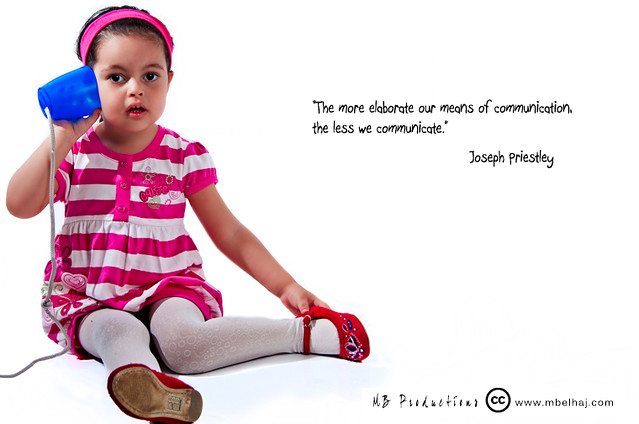You may not always think so after a long and gruelling parents' evening, but parents are your friends! By keeping them well-informed of their child's progress, you not only keep them happy but also may be able to enlist their assistance.
One of the first reports I ever wrote consisted of two sentences:
"X has a natural flair for this subject, and could do very well. However, he prefers to waste his time messing about and disrupting the others, and so if his behaviour and attitude have not changed by the end of this term I will be taking him off the course."
His parents came to see me, as did he, full of dismay, embarrassment and apologies. I'm pleased to say that after that he worked well, and did well.
Would I do the same again today? Yes, but I'd probably do it much earlier, because it is so much easier to send information out these days.
 "Communication", by Le1perrain https://www.flickr.com/photos/mbelhaj/
"Communication", by Le1perrain https://www.flickr.com/photos/mbelhaj/
Report frequently
Unless your school has a policy of not communicating with parents, there is no reason that you should wait until the formal school reporting times to inform parents how their children are doing. As you will already have recorded the relevant data on each student about their attainment on different tasks, assignments or projects, it shouldn't be too much effort to do a mail-merged letter or report at the end of each block of work, or once every half-term, say.
Make work available
If that suggestion sounds like too much work, then another thing you can do (and ought to do anyway, in my opinion), is give parents a log-in so they can see, and comment upon, their child's work, and read your comments too. Obviously, you'll need to get the go-ahead to do this, and then possibly enlist the assistance of the technical support person or team to implement it, but it can be done.
Explain the context
There's no point sending out a report that states that Jimmy did fairly well at a computer programming task. You're bound to get a parent who phones up to say "Fairly well??!!!". He single-handedly set up our home network, reconfigured the TV remote, and set up home security webcams all over the house." You need to include a paragraph that states something like, "The students were asked to work out how the timetable for parents' evening could be automated, and then devise a program to do it."
Context is all in this sort of thing.
Avoid giving grades if you can
As soon as you give a grade, a mark or a Level, people stop reading once they've seen it. It's much better to give a description of what they can do and can't do, and how they can improve.
Be quick to praise but...
You're not doing anyone any favours if all you do is offer praise, especially if you are struggling to find something worth praising. If the work isn't good enough, for whatever reason, I think you have a moral duty to say that, and to then say what might be done about it.
This article first appeared in Digital Education, the free newsletter for those with a professional interest in educational ICT and Computing. One of the benefits of subscribing – apart from access to unique content – is articles in a timely manner. For example, this article was published in the October 2014 edition.To sign up, please complete the short form on our newsletter page. We use a double opt-in system, and you won’t get spammed.
